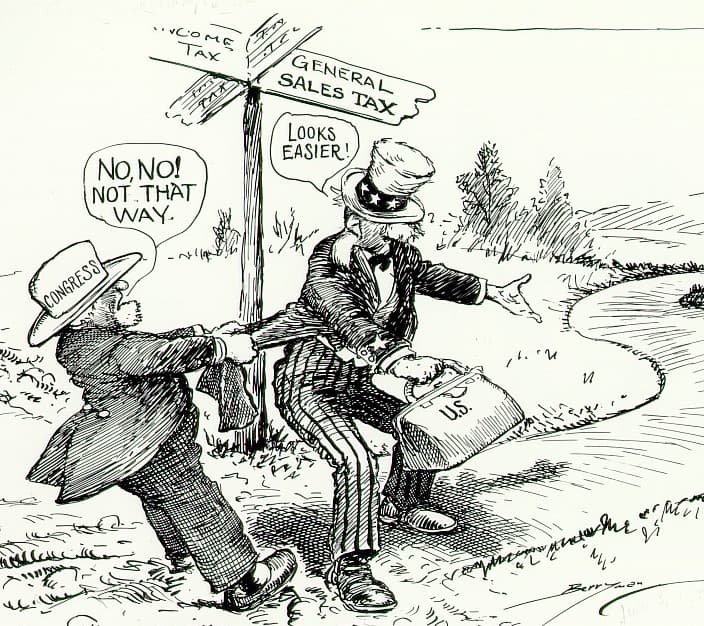How Do You Spell Relief? Try S-a-l-e-s T-a-x
Let Walmart and Amazon be the tax collectors. Odds are they will be vastly more efficient than the IRS, which at this point can’t even return the phone calls of bewildered taxpayers.

Remember the age old question about whether a million monkeys typing for a million years would recreate a Shakespearian play? That question is unanswered but the monkeys have succeeded in producing the United States Tax Code. Actually, given the mindless impenetrability of the 80,000-plus pages of the tax code and accompanying regs, it is insulting to our simian forbears to associate them with it.
Now President Biden wants to double down on this system by hiring more monkeys to expand and enforce the code. Following the example of Lois Lerner, enforcement will be selective. Isn’t that, though, the Democratic way? Before embarking on this exercise in national masochism let us examine the cost and benefits buried in the current 80,000 pages of our tax instruction manual.
A few years ago I commissioned Art Laffer to do a study of the cost of compliance with the American Tax Code. The instructions were to ignore any economic theory about investment distortion or misaligned economic incentives, as important as these might be, and just focus on the quantifiable, out-of-pocket cost of compliance. Answer questions like: How much do we pay H&R Block, how much of our valuable time do we devote to annual compliance? Just the facts.
The answer was an astonishing $420 billion, and remember this was several inflationary years ago. Additional code complexities and intervening inflation have undoubtedly driven that number up. By Congress’s own admission, this complex, inefficient system fails to collect some half a trillion dollars a year in various forms of non-compliance. This is what Mr. Biden’s reinforcements are designed to address.
Bear in mind, too, that this noncompliance number ignores the underground economy — drug dealers, cyber-fraudsters, and millions of ordinary Americans whose untaxed economic activity is estimated in hundreds of billions of sponduluks.
There is a better way — replace the entire income tax monstrosity with a national consumption tax, i.e. a national sales tax. Let Walmart and Amazon be the tax collectors. Odds are they will be vastly more efficient than the IRS, which at this point can’t even return the phone calls of bewildered taxpayers. All retailers already perform sales tax collection services for state governments. So it is hardly a leap of faith to ask them to do it for the Feds.
One of the nice features of a National sales tax is that everybody gets to pay it: when the corner drug dealer goes to Walmart, he pays his taxes.
This would be bad news for tax lawyers and accountants. As some of the brightest minds in the country now devote themselves to crafting fiendishly clever tax avoidance schemes, though, imagine what an unexpected dividend would flow from redirecting all of that creativity to productive activities.
So let’s get this straight. Our current tax system spends around $500 billion a year in order not to collect around $1 trillion a year in non-compliance and underground activities. A consumption tax would cost virtually nothing while making sure the cheats and the crooks pay their fair share. That looks like a great $1.5 trillion trade. And that’s before counting the kicker from all those Elon Musks liberated from tax preparation drudgery.
Aside from the simplicity, a bizarre word for tax discussion, and efficiency of the consumption tax it would make a tool for controlling inflation. Huh? The time-honored approach to inflation is to crush demand with higher interest rates. As we’ve previously noted, this is the economic equivalent of chemotherapy. In addition to the pain of recession and unemployment the blunt instrument of high interest rates inhibits supply creation, the other antidote to inflation, by raising the cost of capital. Like a bad drug, raising rates has a lot of off-target effects.
In addition to raising the cost of capital, thus inhibiting supply growth, it increases the budget deficit. After all, who is the biggest consumer of debt capital: the United States Treasury, of course. If the cost of Treasury bonds got back to the 1970s, circa 10 percent, the interest cost of servicing the debt would consume, on an order of magnitude, something like 75 percent of all tax revenue.
Don’t worry, this wouldn’t crowd out any other federal expenditures, it would just mean more borrowing: a vicious cycle putting greater pressure on rates.
So why are we raising rates to fight inflation? To control demand, of course. As demand dries up, prices must fall. But with a tax on consumer spending you could control demand by raising taxes instead of interest rates. Raising the consumption tax would reduce consumption. This targeted attack on demand might also induce recession and unemployment, but since it doesn’t involve manipulating interest rates, the economic slowdown would mean that rates would fall. The cost of capital would then be poised fuel to the next supply side expansion.
And the Treasury? It would get a twofer — lower rates would mean less interest expense. Higher consumption taxes would mean more tax revenue. This is almost, forgive me, Keynesian in its elegance. You’d be controlling inflation by threatening the economy with a budget surplus. And the monkeys in Washington could take a break.

